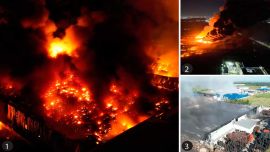Dr. Carlos Silva is a veteran of the hallways of the British Hospital in Buenos Aires, after a career that spans decades with the institution. When the hospital came to inaugurate its new Oncology Centre in July, 2018, there was no-one better suited to the task than the institution's chief oncologist.
Beyond his roles at the hospital, Dr. Silva also teaches medicine as a professor of oncology at the Catholic University of Argentina (UCA) and serves as a member of the advisory boards for multiple pharmaceutical companies.
After a recent report from the International Agency for Research on Cancer (IARC) revealed that 129,000 new cases of cancer are diagnosed every year, he shared his insight into Argentina’s alarming rates with the Times.
There are 68,000 deaths from cancer in Argentina each year, the third-highest rate in Latin America? How has cancer taken such a strong hold?
The healthcare system in Argentina is fragmented, in public, private, and semiprivate institutions. The labour union system has such a strong hold on the sector as well. A big concern is how to cover high-cost medication. At UCA [Catholic University of Argentina] where I’m a professor, we’re teaching people about managing high-cost drugs in oncology. It can be more expensive to access medication, and it can take longer, in the public health sector.
The IARC predicts that cancer rates in Argentina could increase by 50 percent by 2040. How much weight do you put on these projections?
We have to remember that if we start working on early prevention now, we won’t see real results until at least 20 years later, so the numbers won’t be there until after 2040. We’ll probably see more cancer because our population is ageing and we have a very high life expectancy. In middle-upper and high classes, our life expectancy is comparable to Europe. And cancer will increase because of the unhealthy habits that we have in the country. We eat so much meat, for instance, which can contribute to colorectal cancer.
Why do you think that only 46 percent of women in Argentina are receiving mammogram screenings, when the World Health Organisation recommends that 70 percent of women be screened regularly?
It’s not a problem, that we don’t have mammograms to give. There are a lot of machines in Argentina. Organisations and foundations offer mammograms free of charge, so people don’t have to pay for the exams. It’s not a problem of access, but of awareness among women. We’re working with a campaign from the National Cancer Institute to raise awareness among women that they can and should be checked with mammograms.
The country’s technology is adequate, and of course there are some specialised centres with better machines, but we need more than just mammograms. Ultrasonography machines, experienced handlers and good physicians who can give manual breast exams are just as important as mammogram machines.
The British Hospital opened a new Oncology Centre in July of 2018. What does the new centre mean for the hospital’s cancer care?
We are able to see more patients, we are able to treat more patients, but more importantly, we are able to give patients a friendly environment to receive treatment. Oncology can impact patients with great psychological stress, so it’s very important to have a friendly environment to receive treatment. We’re giving to the patients not only chemotherapy but also psychosocial assistance. We also run academic initiatives at the Centre like our residence in oncology.
What is the British Hospital’s main focus in preventing further hikes in cancer rates in Argentina?
Our campaigns are mostly directed toward the prevention of breast and colorectal cancer, so we’re focused on secondary prevention and early diagnosis.
We work with the public health sector to spread information out to the people. Public education programmes can also prevent cases of lung cancer, which is mostly done through primary prevention like curbing smoking and other bad habits. And we work on early detection of skin cancer, working on prevention with dermatologists. Brazil, Uruguay, Colombia and Argentina have the highest incidence of skin cancer in Latin America due to sun exposure habits. We’re focused on prostate cancer, but there’s less of a clear strategy.





















Comments